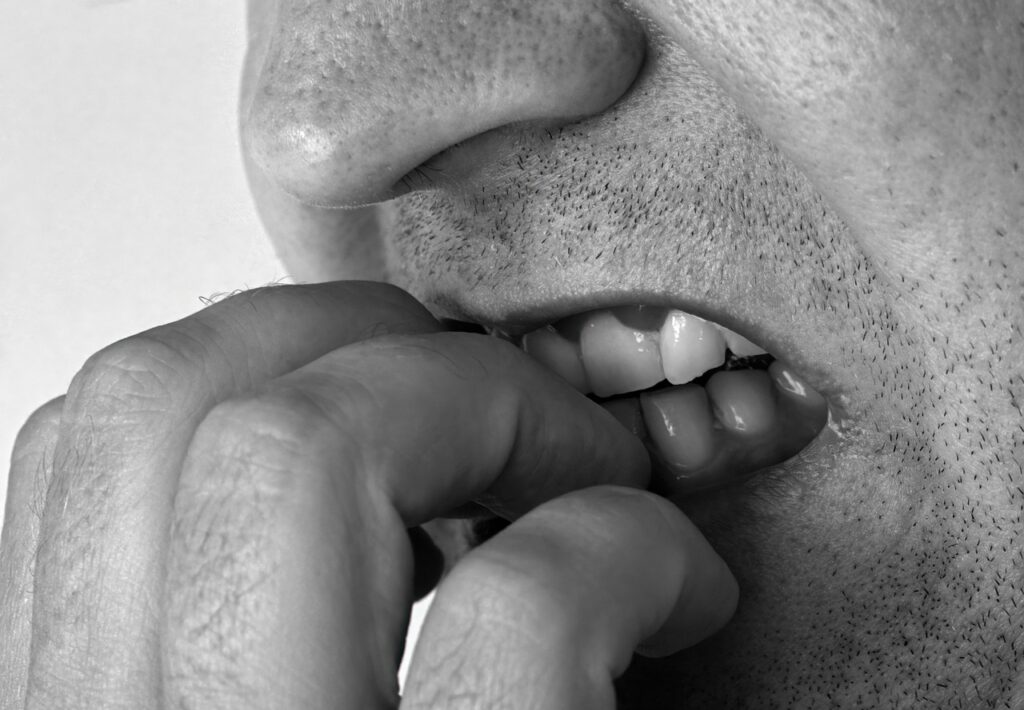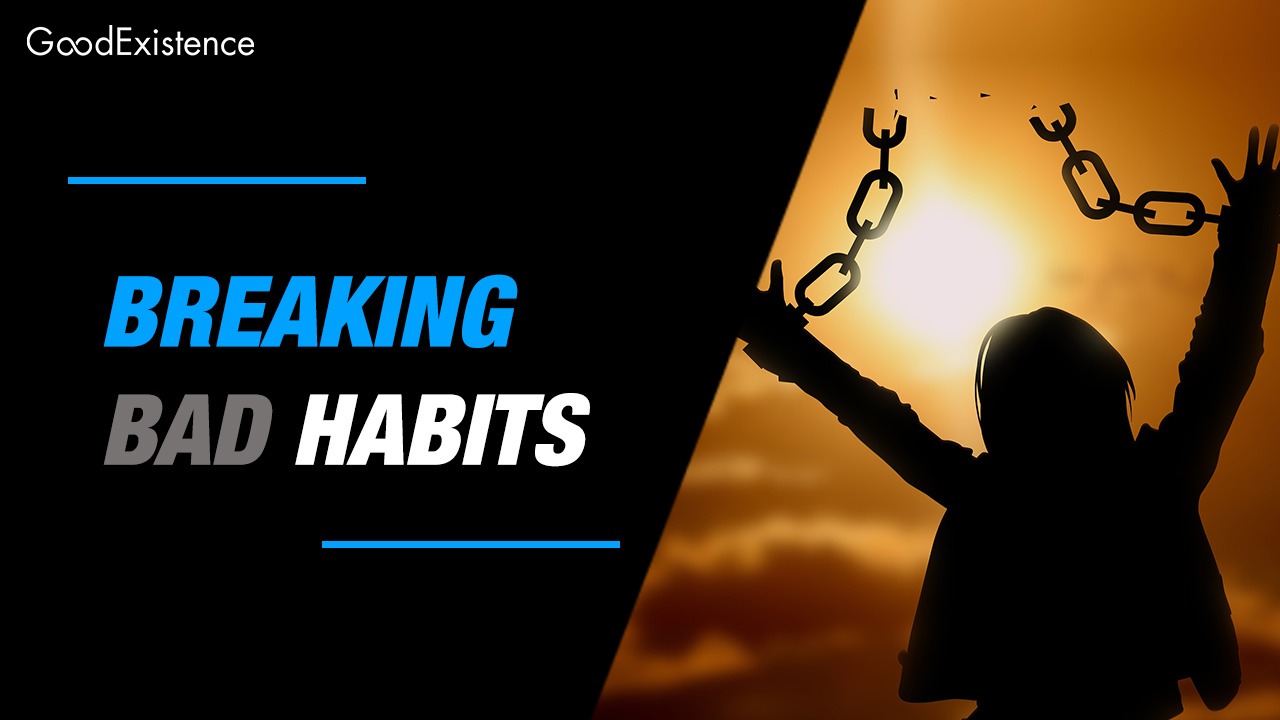We all have some bad habits that we would like to get rid of, but breaking them can seem like an overwhelming task. However, with some effort and persistence, it is possible to break bad habits and replace them with good ones. In this article, we will discuss five simple steps to help you break your bad habits.
You will also find some extra tips and answers to some common questions at the end of this post, that will hopefully help you kick start a new chapter in your life.
1. Identify your bad habits

The first step in breaking a bad habit is to identify it. Many of our habits are automatic and unconscious, so it can be challenging to recognize them. However, taking the time to reflect on your behavior can help you to identify the habits you want to change.
Start by making a list of your bad habits. It could be anything from biting your nails to spending too much time on your phone or watching porn. Once you have your list, rank your habits in order of priority.
Which habits are having the most negative impact on your life? Which habits do you want to change the most?
Once you have identified your bad habits, it’s important to understand why you engage in them. Are they a way to cope with stress or anxiety? Do they provide a temporary sense of pleasure or relief?
Understanding why you engage in a habit can help you to develop strategies to break it.
2. Understand the trigger

Every habit has a trigger, a cue that prompts you to engage in the behavior. Understanding the trigger is crucial for breaking a bad habit. It allows you to recognize when you are about to engage in the behavior and take steps to avoid it.
To understand the trigger for your bad habit, start by paying attention to the circumstances in which it occurs. Once you have identified the trigger, you can take steps to avoid it or replace it with a healthier behavior.
For example, if you tend to snack when you are bored, you could replace that habit with a healthier one, like going for a walk or doing a short meditation.
3. Replace the bad habit with a good one

Breaking a bad habit is not enough. You need to replace it with a good one. This helps to rewire your brain and create a new habit. The key is to choose a behavior that is healthier and more aligned with your values.
To choose a good habit to replace a bad one, start by thinking about what you want to achieve. What are your goals? Do you want to be healthier, more productive, or happier? Once you have a clear idea of what you want, choose a habit that will help you achieve your goals.
For example, if you want to be healthier, you could replace your habit of snacking on junk food with a habit of eating more fruits and vegetables.
Or if you want to be more productive, you could replace your habit of checking social media with a habit of working on a specific task for a set amount of time. You could also use tools such as a Pomodoro Timer, to “force” yourself to work for at least 25 minutes before taking a break.
4. Create a plan and track your progress

Breaking a bad habit takes time and effort. To stay motivated and on track, you need to create a plan and track your progress. This allows you to see your progress and celebrate your successes.
To create a plan, start by setting achievable goals. For example, if you want to stop smoking, you could set a goal of reducing your smoking by one cigarette per day.
Once you have your goal, create a plan to achieve it. This could involve finding a support group, using nicotine patches, or practicing mindfulness meditation.
As you work on breaking your habit, it’s important to track your progress. This allows you to see how far you have come and identify areas where you need to improve.
You could use a journal or an app to track your progress and reflect on your successes and challenges.
For example, when I started to lose weight I would track my progress via different mobile apps daily, this gave me a huge moral boost to keep on pushing to lose even more pounds seeing how far I’ve come (In the end I’ve lost a little bit over 100 pounds…)
5. Get support from friends and family

Breaking a bad habit can be challenging, but you don’t have to do it alone. Getting support from friends and family can help you stay motivated and accountable.
Talk to the people in your life about your goals and ask for their support. They can provide encouragement and help you stay on track.
For example, if you are trying to quit smoking, you could ask a friend to check in with you every day and provide support when you feel the urge to smoke.
You could also join a support group or seek the help of a professional. There are many resources available to help you break bad habits, including therapists, coaches, and online support communities.
More tips for breaking bad habits
- Be patient with yourself: Breaking a habit takes time and effort. Don’t be too hard on yourself if you slip up. Instead, use it as an opportunity to learn and improve.
- Focus on one habit at a time: Trying to break multiple habits at once can be overwhelming. Focus on one habit at a time and give yourself time to master it before moving on to the next one.
- Celebrate your successes: Breaking a habit is a significant accomplishment. Celebrate your successes along the way, no matter how small they may seem.
- Find healthy ways to cope with stress: Many bad habits are a way to cope with stress or anxiety. Finding healthy ways to manage stress, such as exercise, meditation, or spending time with loved ones, can help you break the cycle of bad habits.
- Use positive affirmations: Positive affirmations can help you stay motivated and focused on your goals. Repeat affirmations to yourself, such as “I am in control of my habits,” or “I am making positive changes in my life.”
Final Thoughts
Of course, it goes without saying that breaking a bad habit is always going to be challenging, but it is possible with the right mindset and strategies.
By identifying your bad habits, understanding the triggers, replacing the bad habits with good ones, creating a plan, and getting support, you can break the cycle of bad habits and create a healthier, happier life.
Remember to be patient with yourself and celebrate your successes along the way. Breaking a habit is a significant accomplishment, and it takes time and effort to achieve. But with determination and support, you can overcome your bad habits and create positive changes in your life.
Breaking Bad Habits – FAQ
Breaking a bad habit can take anywhere from a few weeks to several months, depending on the habit and the person.
It takes time to form new habits and replace old ones, so it’s important to be patient and persistent in your efforts.
Research suggests that it takes an average of 66 days (source) to form a new habit, so it’s important to stick with it even if you slip up along the way.
Relapsing is a common part of the process of breaking a bad habit, and it’s important to not get discouraged by setbacks.
Use relapses as opportunities to learn and improve, and adjust your approach if necessary. Identify what triggered the relapse and make a plan for how to handle similar situations in the future.
Remember to be patient with yourself and celebrate your successes along the way, no matter how small they may seem.
Breaking a bad habit can be uncomfortable and even painful at times. It’s important to find healthy ways to cope with discomfort, such as exercise, meditation, or spending time with loved ones.
Focus on the positive changes that will come from breaking the habit, and remind yourself of your reasons for wanting to break it.
Celebrate your successes along the way, no matter how small they may seem, and don’t be too hard on yourself if you slip up. Remember that breaking a bad habit is a significant accomplishment, and it’s worth the effort.
The information provided in this article is for informational purposes only and should not be taken as medical advice. Consult with a healthcare professional for personalized guidance and to discuss the risks and benefits of any treatment.
